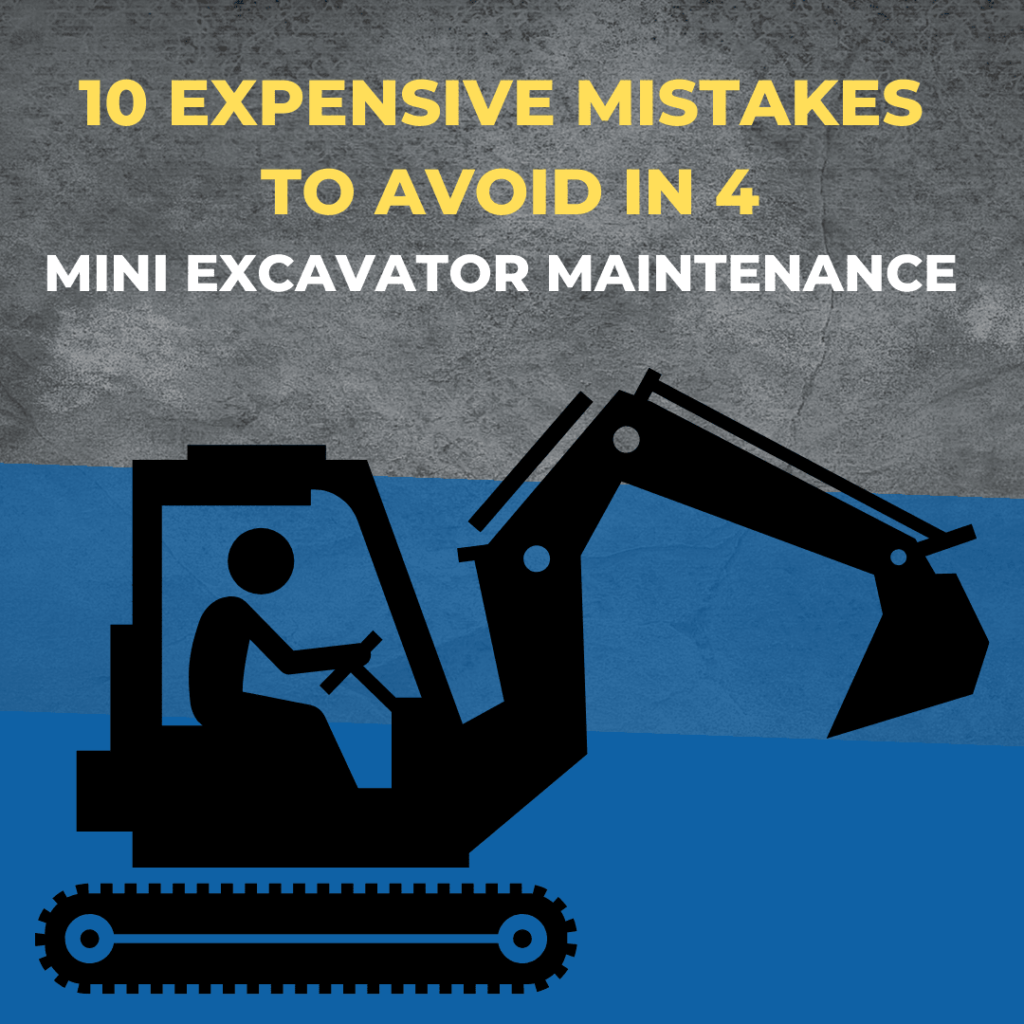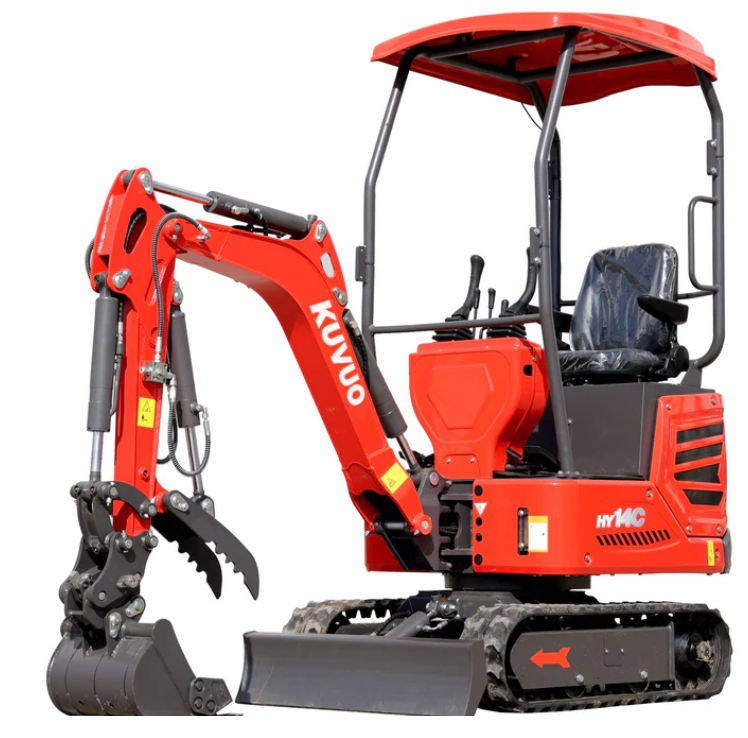Free Shipping Within USA | 1-year Warranty
10 Expensive Mistakes To Avoid In Mini Excavator Maintenance

Tough, dependable, and designed to handle challenging tasks, mini excavators run at their best, though, they require routine Mini Excavator maintenance, just as any industrious machine. Ignoring maintenance not only reduces their lifetime but also causes expensive repairs, unanticipated breakdowns, and safety concerns. Not only does a well-kept mini excavator run more effectively, but it also reduces accidents, increases fuel economy, and raises job site output.
Want to prevent pointless headaches? Steering clear of these typical maintenance errors will help you take care of your small excavator.
1. One Should Not Miss Any Routine Inspections.
Starting straight away is simple, but neglecting to check your machine before and after every use runs a great risk. Ignoring little issues like a tiny fluid leak or a loose screw could soon become major repairs. Regular inspections also help operators to identify wear and tear before it compromises performance.
Develop a daily routine of checking over your excavator. Look for anything that seems strange, worn-out parts, or leaks. Go over the undercarriage, hoses, and connections extremely carefully. Ok for signs of rust, cracks, or oil leaks. A few minutes of looking could prevent expensive repairs and hours of downtime.
2. Ignoring The Manual Of Operations
Though many operators never read it, every small excavator comes with a manual. That is an error. Essential information on mini excavator maintenance schedules, troubleshooting, and correct functioning is found in the handbook. Ignoring this important tool usually leads to poor handling, wrong fluid use, and missed service intervals.
Keep the handbook close at hand and consult it often. Check the manufacturer’s website for a digital copy should it be absent. Following the advised rules helps maintain the best possible condition of your machine. Spend some time learning troubleshooting techniques so that little problems can be fixed before they become more serious.
3. Ignoring Fluid Level Check
The lifeblood of your excavator is fluid—including hydraulic, coolant, and oil. Running low on any one of them can cause overheating, slow performance, or perhaps engine failure. Old or contaminated fluids might also lead to issues that compromise moving part efficiency.
Every day before beginning work, check fluid levels. As necessary, top them; follow the advised fluid change schedule. To guarantee compatibility, use just the manufacturer-recommended fluids. Look for fluid contamination—that is, milky or dirty oil—that can point to internal problems.
4. Ignoring The Air Filters
Quick clogging of the air filter by dust and trash reduces engine performance and fuel consumption. A dirty air filter drives the engine to run harder than it should, increasing running costs and perhaps causing engine damage over time.
What to do: particularly in dusty environments, routinely check the air filter. When called for, clean or replace it. Better performance, reduced fuel expenditures, and less engine strain follow from a clean filter. Maintaining spare filters guarantees that replacements are done right away.
5. Overlooking Grease Points
Several moving components on your excavator require lubrication. Components age faster without appropriate lubrication, which causes malfunctions and costly repairs. Grease increases the lifetime of critical components, lessens friction, and stops corrosion.
Follow the greasing timetable in the handbook. Focus especially on important points such the boom, arm, and bucket pins. Always use the manufacturer’s advised correct kind of lubricant. Applying either too much or too little grease might be equally detrimental as ignoring it completely.

6. Using the Wrong Attachments
Every tiny excavator cannot fit every attachment. Using the incorrect one could strain the equipment and, over time, result in harm. Additionally, causing stability problems and increasing the likelihood of tipping or breakdown are overloading or poor tool attachment.
Always be sure attachments fit the specs of your excavator. Verify their installation and keep within weight restrictions to prevent stressing the machine unnecessarily. Look for wear on attachment points and clear any trash that can impede correct operation.
7. Letting Dirt Build Up
Though they may not seem like a huge worry now, over time mud, dust, and dirt can clog vital components, causing mechanical problems and rust. Additionally, increasing stress on seals, dirt accumulation can cause hydraulic system leakage.
Regular cleaning of your mini excavator is advised, particularly in dusty or muddy surroundings. Though avoid spraying straight into seals and electrical components, a pressure washer performs effectively. Pay close attention to radiator fins, air vents, and track components; trash accumulation in these places might affect performance.
8. Ignoring Warning Signs
Your machine uses strange noises, vibrations, or dashboard warning lights to alert you of something being incorrect. Ignoring these indicators might cause major malfunctions, safety concerns, and expensive fixes.
What should you pay attention to—the sound and feel of your excavator? If something feels wrong, probe right away. Early resolution of minor problems helps them not to grow into major ones. Teach operators to spot and document warning signals right away.
9. Avoiding Planned Maintenance
Frequent tune-ups maintain your small excavator in perfect operating order. Ignoring planned mini excavator maintenance causes preventable breakdowns and more expensive repairs. Preventive maintenance is often far less expensive than emergency repairs or replacements.
What to do: follow your handbook’s mini excavator maintenance calendar. This covers expert inspections as needed, oil changes, and filter replacements. See a skilled technician if you are not at ease performing it yourself. Make sure none of the tasks are overlooked by keeping a checklist.
10. Storing the Machine Improperly
Where and how you keep your excavator counts. Harsh weather can lead to rust and wear; parking on uneven ground can strain tires and tracks. Inappropriate storage can also cause fluid damage, battery drain, and mildew growth in the cab.
Store your excavator whenever at all feasible in a covered, dry environment. Should it have to remain outside, cover it from the sun and rain with a premium tarp. Park always on level ground to minimize stress on its parts. Remove the batteries, drain fluids if needed, and do a thorough check before returning it to use if stored for longer lengths of time.
Bonus advice: Record mini excavator maintenance notes
Monitoring inspections, repairs, and service history keeps you in line. By reminding you when the mini excavator maintenance is due, from a basic diary or digital record, you may help to prevent overlooked actions. Maintaining resale value and diagnosing reoccurring problems also depend on logging repairs and service.
Last words
Maintaining your small excavator is not difficult, but it does depend on consistency. Years of safe and effective operation of your machine will depend on regular inspections, timely repairs, and manufacturer standards followed.
Little work now will save you money and time later on. Treat your excavator well; it will take care of you when most needed. A machine kept in good condition runs better, lasts longer, and lets you do tasks without needless pauses.
